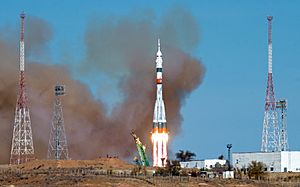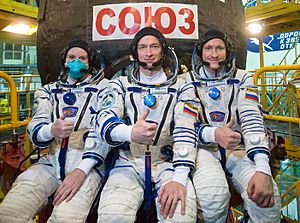Soyuz MS-17 facts for kids

Favor launches atop a Soyuz-2.1a
|
|
| Names | ISS 63S |
|---|---|
| Mission type | Crewed mission to ISS |
| Operator | Roscosmos |
| Website | https://www.roscosmos.ru/ |
| Mission duration | 184 days, 23 hours, 10 minutes |
| Spacecraft properties | |
| Spacecraft | Soyuz MS No.747 Favor |
| Manufacturer | RSC Energia |
| Crew | |
| Members |
|
| Start of mission | |
| Launch date | 14 October 2020, 05:45:04 UTC |
| Rocket | Soyuz-2.1a (s/n Х15000-045) |
| Launch site | Baikonur, Site 31 |
| Contractor | RSC Progress |
| End of mission | |
| Landing date | 17 April 2021, 04:55 UTC |
| Landing site | Kazakh Steppe, Kazakhstan |
| Orbital parameters | |
| Reference system | Geocentric orbit |
| Regime | Low Earth orbit |
| Inclination | 51.66° |
| Docking with ISS | |
| Docking port | Rassvet nadir |
| Docking date | 14 October 2020, 08:48:47 UTC |
| Undocking date | 19 March 2021, 16:38:27 UTC |
| Time docked | 156 days, 7 hours and 49 minutes |
| Docking with ISS (Relocation) |
|
| Docking port | Poisk zenith |
| Docking date | 19 March 2021, 17:12:35 UTC |
| Undocking date | 17 April 2021, 01:34 UTC |
| Time docked | 28 days, 8 hours and 21 minutes |
 Rubins, Ryzhikov, and Kud-Sverchkov Soyuz programme (crewed)
|
|
Soyuz MS-17 was a Soyuz spaceflight that was launched on 14 October 2020. It transported three crew members of the Expedition 63/64 crew to the International Space Station. Soyuz MS-17 was the 145th crewed flight of a Soyuz spacecraft. The crew consisted of a Russian commander and a Russian and American flight engineer.
The mission marked the first use of a new "ultrafast" two-orbit rendezvous flight plan with the Soyuz, which saw Soyuz MS-17 arrive at the ISS within approximately three hours after the launch.
On 19 March 2021, the crew of Soyuz MS-17 boarded their spacecraft to relocate it from Rassvet to Poisk to make way for the arrival and docking of the Soyuz MS-18 spacecraft, which launched on 9 April 2021 carrying cosmonauts Oleg Novitsky, Pyotr Dubrov and the astronaut of NASA, Mark T. Vande Hei to the ISS ahead of a six-month stay. The two spacecraft had a nine-day handover period before Soyuz MS-17 departed. This is necessary to avoid de-crewing the Russian Orbital Segment (ROS) of the ISS since no Russian cosmonaut was present aboard SpaceX Crew-1.
Contents
Crew
| Position | Crew member | |
|---|---|---|
| Commander | Expedition 63/64 Second spaceflight |
|
| Flight Engineer 1 | Expedition 63/64 First spaceflight |
|
| Flight Engineer 2 | Expedition 63/64 Second spaceflight |
|
Backup crew
| Position | Crew member | |
|---|---|---|
| Commander | ||
| Flight Engineer 1 | ||
| Flight Engineer 2 | ||
Reserve crew
| Position | Crew member | |
|---|---|---|
| Commander | ||
| Flight Engineer 1 | ||
Gallery
See also
 In Spanish: Soyuz MS-17 para niños
In Spanish: Soyuz MS-17 para niños



